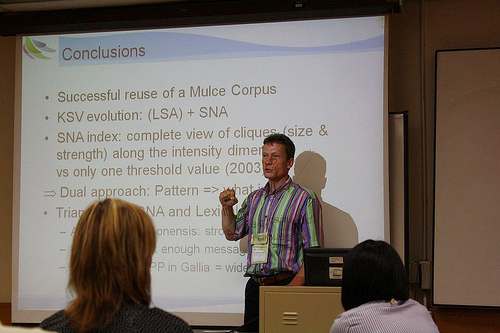
Introduction to Social Network Analysis theory and its application to CSCL
Tutoriel SNA à CSCL 2011, Hong Kong, le 4 juillet 2011
organisé par Christophe REFFAY (UMR STEF - ENS Cachan) et Alejandra MARTÍNEZ-MONÉS (University of Valladolid)

Dans le cadre de ce tutoriel, Christophe Reffay et Alejandra Martinez-Mones ont présenté des données extraites du corpus Simuligne de Mulce afin de faire appliquer aux participants (travaux pratiques) des analyses de réseaux sociaux (SNA)
Exemple de corpus Mulce avec analyse SNA
Corpus distinguable Simuligne "Social Network Analysis, online group communication structure and the measure of cohesion" : identifiant mce-simu-sna-all (url à modifier). Ce lien renvoie vers la fiche descriptive du corpus, mais toutes les données correspondantes sont téléchargeables sur le site en ligne de la base de corpus Mulce.
Voici un extrait du programme tel que en ligne
Who is this tutorial designed for and what for ?
You are a researcher from one of the various disciplines that CSCL has attracted. You are analysing CSCL situations, or designing and developing tools to support such collaborative learning situations. In your personal or professional live, you may have taken part in the early social networking wave on the Web2.0 by using Facebook, LinkedIn, Twitter, Ning, Blogger, or Diigo (among the most famous) and got some advantages (or not) from this high connectivity with others. But until now, you did not take time to get informed on Social Network Analysis as a conceptual framework that could give you a complementary interpretation of your data when they can be described as networks.
This tutorial has been designed by Christophe Reffay and Alejandra Martinez-Mones, both with wide experience in applying Social Network Analysis theory and techniques on collaboration analysis in CSCL situations. It is especially designed for researchers that want to take the opportunity of their presence at the CSCL conference to :
* see and experiment the basic concepts of Social Network Analysis,
* decide whether Social Network Analysis can be applied in their own research,
* get general and CSCL specific references to deepen their knowledge and understanding on Social Network Analysis and its use in our field and
* experiment practical Social Network Analysis tools and techniques and get advice on what is available and on what start with.
What is Social Network Analysis ?
Social Network Analysis is an original approach to analysis that focuses on the study of the relationships among members in a community or a group. It affords formal and intuitive ways of studying collaboration.
Social Network Analysis is a new conceptual and methodological perspective for the study of social groups. Although the foundational ideas emerged around 1930, it was not until 1970 when it started to appear as an interdisciplinary science, in parallel to the development of new theories and the generalization of computers. From then on, it has experienced a fast development, and it has been applied to studies in very diverse domains, such as organizational sciences, medicine, politics, information flow in Internet, complex systems and more recently, to the analysis of the social networking phenomena.
SNA has a relevant presence in our community, with an increasing number of papers that employ it in the last conferences since 1999. It has been used by CSCL researchers and practitioners for different goals, ranging from research on social structures, to mixed-evaluation methods, or as a tool to regulate students’ behaviour.
Besides this, SNA is based on formal methods expressed in mathematical terms. This means that it is well suited to be applied by automatic methods and tools. In fact, the construction of tools that exploit this potential to support evaluation or regulation is a research topic in itself in our community.
Retrouvez toutes les infos et tous les supports utilisés dans ce tutoriel sur la page web de ce tutoriel (site de l’UMR STEF à Cachan) :
SNA@CSCL2011 by C. Reffay & A. Martinez-Mones